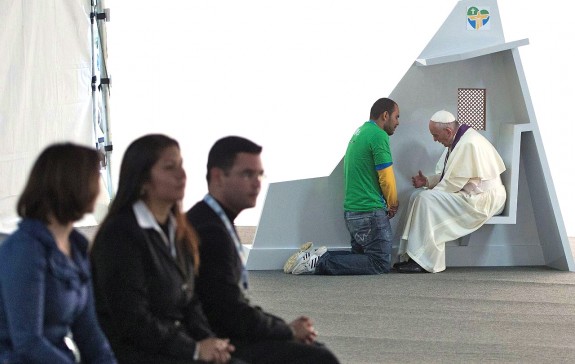From the Vatican, Pope Francis’ remarks to participants in a “Course on the Internal Forum,” dealing with reconciliation and the ministry of confessors:
You are called to always be “men of the Holy Spirit,” witnesses and heralds, joyful and strong, of the resurrection of the Lord. This testimony is read on the face, is heard in the voice of the priest who administers with faith and with “unction” the Sacrament of Reconciliation. He welcomes penitents not with the attitude of a judge, not even with that of a simple man, but with the charity of God, with the love of a father who sees the son returning and goes to meet him, [with the love] of the shepherd who has found the lost sheep. The heart of the priest is a heart that knows how to be moved, not by sentimentality or mere emotion, but to the “tender mercy” [viscere di misericordia] of the Lord! If it is true that tradition points out the dual role of doctor and judge for confessors, we must never forget that as a doctor he is called to heal and as a judge, to absolve.
The second aspect: if Reconciliation transmits the new life of the Risen Lord and renews baptismal grace, then your task is to give it generously to others. A priest who does not attend to this part of his ministry, both in the amount of time spent and in the spiritual quality, is like a shepherd who does not take care of the sheep that were lost; he is like a father who forgets the lost son and neglects waiting for him. But mercy is the heart of the Gospel! It is the good news that God loves us, that He always loves the sinner, and with this love draws him to Himself and invites him to conversion. We must not forget that the faithful often have difficulty approaching the sacrament, whether for practical reasons, or because of the natural difficulty of confessing one’s sins to another person. For this reason it is necessary to work hard on ourselves, on our humanity, never to be an obstacle but always to favour drawing near to mercy and forgiveness.
Here we must guard against two extremes: rigorism and laxism. Neither is good, because in reality they don’t take charge of the person of the penitent. Instead, mercy truly listens with the heart of God and wants to accompany the soul on the path of reconciliation. Confession is not a court of condemnation, but an experience of forgiveness and mercy!











